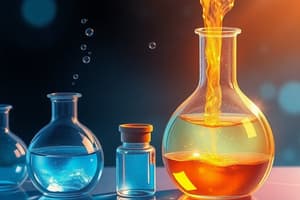Podcast
Questions and Answers
What is a solution?
What is a solution?
- A solid mixture
- A gas mixture
- A liquid mixture where the solute is distributed in the solvent (correct)
- A mixture of two solids
What does a mixture refer to?
What does a mixture refer to?
A substance made by mixing other substances together.
What is a solute?
What is a solute?
A substance dissolved in another substance.
What is a solvent?
What is a solvent?
What does the rate of solution refer to?
What does the rate of solution refer to?
How can the rate of solution be increased?
How can the rate of solution be increased?
What is solubility?
What is solubility?
What is concentration in chemistry?
What is concentration in chemistry?
What is a concentrated solution?
What is a concentrated solution?
What defines a dilute solution?
What defines a dilute solution?
What is a saturated solution?
What is a saturated solution?
What is an unsaturated solution?
What is an unsaturated solution?
What is a supersaturated solution?
What is a supersaturated solution?
What does insoluble mean?
What does insoluble mean?
What is a heterogeneous mixture?
What is a heterogeneous mixture?
What are alloys?
What are alloys?
What is a colloid?
What is a colloid?
Flashcards
Solution
Solution
Homogenous liquid mixture where a solute is uniformly distributed within a solvent.
Mixture
Mixture
A substance created by combining two or more different substances.
Solute
Solute
The substance that is dissolved in a solvent.
Solvent
Solvent
Signup and view all the flashcards
Rate of Solution
Rate of Solution
Signup and view all the flashcards
Solubility
Solubility
Signup and view all the flashcards
Concentration
Concentration
Signup and view all the flashcards
Concentrated Solution
Concentrated Solution
Signup and view all the flashcards
Dilute Solution
Dilute Solution
Signup and view all the flashcards
Saturated Solution
Saturated Solution
Signup and view all the flashcards
Unsaturated Solution
Unsaturated Solution
Signup and view all the flashcards
Supersaturated Solution
Supersaturated Solution
Signup and view all the flashcards
Insoluble
Insoluble
Signup and view all the flashcards
Heterogeneous Mixture
Heterogeneous Mixture
Signup and view all the flashcards
Alloy
Alloy
Signup and view all the flashcards
Colloid
Colloid
Signup and view all the flashcards
Study Notes
Solution Science Overview
- A solution is a liquid mixture with a uniform distribution of the solute (minor component) within the solvent (major component).
- Mixture refers to a substance formed by combining various substances together.
- Solute is the substance dissolved in the solvent, usually present in a lesser quantity in a solution.
- A solvent is the medium in which the solute is dissolved, forming a solution.
Rates and Factors of Dissolution
- Rate of solution refers to the process of dissolution when a solute dissolves in a solvent, influenced by various factors.
- Increasing the surface area of the solute or breaking it into smaller pieces enhances the rate of solution.
- Stirring the mixture helps bring fresh solvent into contact with the solute, speeding up dissolution.
Key Concepts of Solubility
- Solubility is a property quantifying how much solute can dissolve in a solvent, measured at equilibrium as a saturated solution.
- Concentration relates to the abundance of a component within a mixture, described through various mathematical terms like mass or molar concentration.
Types of Solutions
- A concentrated solution has a high amount of solute compared to the solvent.
- A dilute solution results from mixing more solvent with a solution, lowering the solute concentration.
- A saturated solution is at maximum solute capacity; additional solute results in precipitation or gas release.
- An unsaturated solution can still accommodate more solute without reaching saturation.
- A supersaturated solution contains more solute than typically possible under standard conditions.
Miscellaneous Properties
- Insoluble substances cannot dissolve in a solvent.
- Heterogeneous mixtures consist of components with non-uniform distribution, visible localized regions differing in properties.
- Alloys are metallic materials composed of multiple elements, with at least one being a metal, exhibiting unique properties distinct from their components.
- A colloid contains particles ranging from 1 to 1000 nanometers that remain dispersed within the solution without settling out.
Studying That Suits You
Use AI to generate personalized quizzes and flashcards to suit your learning preferences.




